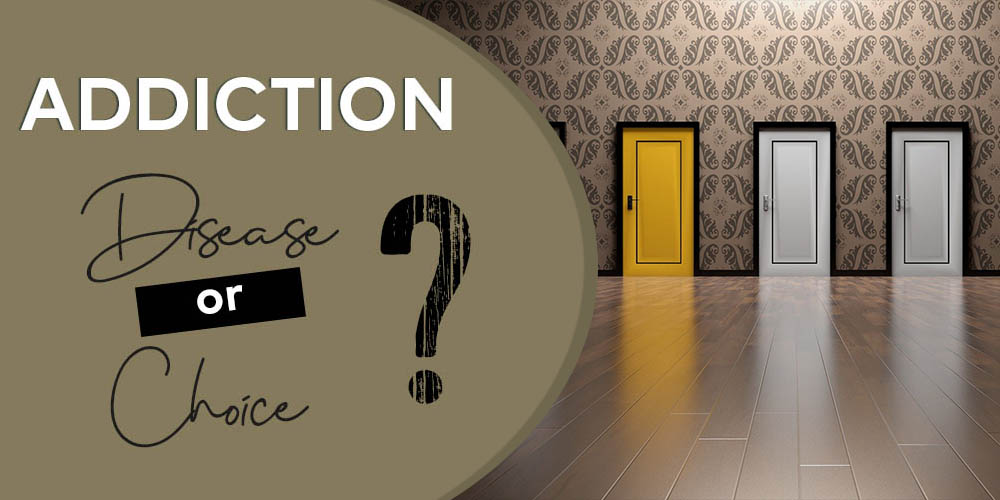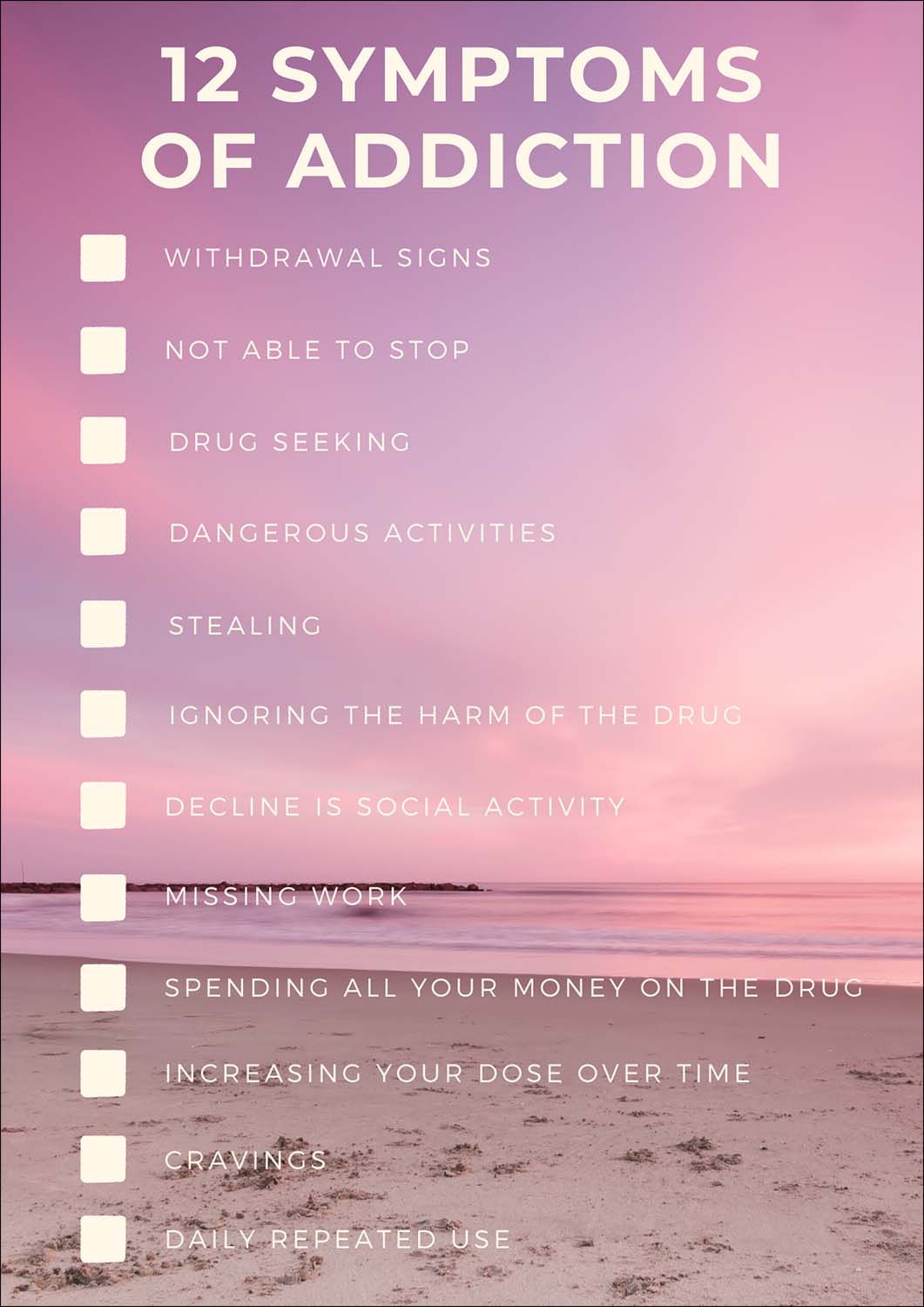Is addiction a disease? Is alcoholism genetic? Or is it simply a personal choice?
These are all questions that we’ll discuss in this article. Plus, we’ll take a look at recovery and what it really means. We’ll also look at 12 symptoms of addiction and contributing factors for developing an addiction and whether or not addiction can be traced back to childhood or genetics.
Addiction has as much to do with societal norms, as it does with disease or a moral failing. Drugs in movies are portrayed in crime scenes, liberation and for the fight against boredom.
If that’s not confusing, I don’t know what is?
The question remains, is addiction a vice, a sin, a crime or a disease? Or might it be a societal issue?
Public opinion on the matter is shaped by professional, social and geopolitical interests.
Before we dive into whether or not addiction is a disease or a personal choice. Let’s first establish what addiction is.

Is Addiction a Disease – a Brief History
Alcoholism, or alcohol addiction wasn’t always classified as a disease. In fact, it used to be punishable by law.
In 1956 the American Medical Association (AMA) declared that alcoholism was an illness. At this time the AMA stated that alcoholism was:
“a major medical problem” and “is a treatable disease, not a moral failing.”
It wasn’t until 1987 that other forms of addiction were considered a disease.
Prior to addiction being deemed a disease, many addicts were treated harshly. They often received severe punishments like scalding baths and other forms of physical abuse. Shockingly, it was also considered important to sterilize alcoholics.
During the 17th century alcohol played a major role in colonial life. Drinking was acceptable, whereas drunkenness was not tolerated. It wasn’t until the dawning of industrialization (in the late 18th century), when people needed to be sober to operate machinery, that sobriety became a thing. Before then people would commonly drink small amounts throughout the day.
The Victorians played a pivotal role in the development of addiction. In the 19th century, they took all sorts of drugs, from alcohol to opium and heroin (in the latter part, after needles were invented in the 1840s). They seemed very interested in exploring altered mind states.
In the 1800s a mixture of alcohol and opium was sold as a solution for colds and coughs, under the name “Ayer’s Cherry Pectoral”. The creators of this sort of medicine would prey on worried mothers at a time when child deaths were common. Stating that the medicines effects “are magical and multitudes are annually preserved from serious illness by its timely and faithful use.”
The concept of opiates being addictive never arose until much later on.
During the early 19th century the common view of opiates shifted, from a cough syrup that babies took, to a highly addictive drug. Drunkenness was seen as the mother of poverty.
Our taste for drugs and mind-altering substances isn’t new. However, as a society, we’re now moving to more synthetic drugs like MDMA vs Molly or ketamine.
Knowing why did the war on drugs start in the 1970s isn’t as important as the fact that it began to radically stir our moral stance on addiction.
Moving from Moral Failure to Empathy
‘Drunkenness is nothing but voluntary madness.’
—Lucius Annaeus Seneca, Roman Philosopher (c. 4 BC-AD 65)
The modern understanding is that a substance use disorder is preceded by altered brain states. Removing the addict’s ability to regulate use of certain medical or illegal drugs.
Blindfolding the addict from the destruction that is caused by their choices.
Some drugs are more addictive than others. However, the same pattern emerges, whereby a person will build up a tolerance for the drug, taking higher and higher doses to feel any effect.
During the 19th and 20th centuries, the temperance movement spread across the world. Often associated with churches. Temperance movements called for moderate drinking or total abstinence.
Teetotalism was a term coined in the 1830s due to social problems created by the overconsumption of alcohol. The movement promoted practice or the promotion of complete abstinence from alcohol.
Is Addiction a Disease That is Hereditary or Genetic?
Alcoholism has been connected with specific genes. Meaning that a person can be born predisposed to alcoholism. This doesn’t mean that they’ll definitely become an addict, however it does increase the chances, if certain contributing factors are present.
“Research shows that genes are responsible for about half of the risk for AUD. Therefore, genes alone do not determine whether someone will develop AUD. Environmental factors, as well as gene and environment interactions account for the remainder of the risk.”
– National Institute of Alcohol Abuse and Alcoholism (NIAAA)
Contributing Factors for Developing Addiction
Drug use normally starts as an experimental phase in adolescence. Many don’t become addicted. For others, rapid deterioration toward addiction is imminent. As with many other mental health disorders, there are often events that trigger drug addiction, such as:
- Environment – the people around you, including family and friends’ opinions on drugs. Peer pressure and exposure also affect drug use.
- Genetics – can play a part in addictive behaviors. Especially after you’ve started to take drugs. This can change whether or not you become addicted.
- Family History – there might be a genetic predisposition to becoming addicted. It’s been found that having a close family member who’s an addict, can increase your chances of developing a substance use disorder.
- Mental Health – people with a co-occurring mental health disorder are more vulnerable to becoming addicted to drugs. This is due to drugs being used as coping mechanisms to overcome painful feelings.
- Early Use – people who experiment with drugs early on in life are more likely to become addicted later on due to the changes that happen in their brains.
Changing the status of addiction
Shockingly 6 to 8% of the nursing profession suffers from an addiction that can alter their ability to work effectively. This is a worrying statistic because we rely on these professionals in times of need.
Addiction actually changes your reward centers in the brain altering how you experience pleasure. These physical changes are long-lasting and contribute to the sensations of cravings, as well as frustration or depression.
12 Symptoms of Addiction
Addiction leads to altered behavior. As such, the symptoms are based on what we choose to do. Here are twelve signs that you have a substance use disorder. The word “drug” can be substituted for any addictive substance, including huffing and alcohol.
- Withdrawal symptoms if you try to stop
- Trying to stop and not being able to
- Spending a lot of time trying to get your hands on the drug
- Driving, or doing other activities that are dangerous when on the drug
- Stealing or doing other things to get the drug, that you wouldn’t otherwise do
- Knowing the harm the drug is doing to you but ignoring the physical or psychological damage
- Not taking part in social activities
- Not meeting work commitments
- Spending a lot of money on the drug
- Increasing your dose over time
- Cravings or urges for the drug that wipe out other aspects of your life
- An urge to consume the drug regularly

If you or a person you care about is struggling with addiction, it’s important to reach out and get help. It doesn’t matter if you consider it a disease or a choice because a substance use disorder can be treated and the path to recovery is a phone call away.
Related Posts
- Long Term Side Effects of Drugs and Addiction
There's a lengthy list of long-term side effects of drugs and addiction that affect both…
- Effects of Alcohol on the Body and Brain
Even though alcohol consumption is widely accepted in society, there are many negative side effects…
- Addictive Personality Disorder
The last decade has seen an increase in reported cases of substance abuse. Behavioral addictions…
